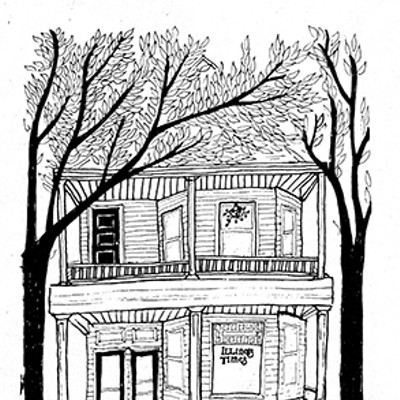Death and dishonor
What do the suicides of Illinois public people tell us?

[
{
"name": "Air - MedRect Combo - Inline Content 1",
"component": "11490391",
"insertPoint": "3",
"requiredCountToDisplay": "1",
"parentWrapperClass": "fdn-ads-inline-content-block"
},{
"name": "Air - MedRect Combo - Inline Content 2",
"component": "11490392",
"insertPoint": "7",
"requiredCountToDisplay": "5",
"parentWrapperClass": "fdn-ads-inline-content-block"
},{
"name": "Air - MedRect Combo - Inline Content 3",
"component": "11490393",
"insertPoint": "12",
"requiredCountToDisplay": "9",
"parentWrapperClass": "fdn-ads-inline-content-block"
}
]
The motives people have for entering the public sphere often are murky. Their motives for leaving it prematurely are usually even more so. Tim Davlin is only the latest of several Illinois public men to have killed themselves recently. Four such deaths have occurred in Chicago since 2007, the latest being Phil Pagano, for 20 years head of Chicago’s commuter rail agency, who in May stepped in front of a speeding train rather than face being fired for rigging his pension.
In each case the victim faced public humiliation. In each case the cause was money, specifically the illegal or unethical getting of it (although the need for the money varied, and did not always involve public funds). Betrayal, bad judgment and greed are not admirable traits even in Illinois, even among our more benighted public people who believe that the only shame in crime is getting caught at it. The specific misdeeds matter less than the victims’ judgment that they were sufficiently grave that their consequences couldn’t be faced.
My concern here is not the private causes of such deaths, but their public effects. Rich Miller for one thinks that Springfield will be hard-put to find as good a mayor. (See “Why Tim Davlin was a Statehouse favorite,” Dec. 22, 2010.) I agree, but we are a long way from needing to vet candidates’ psychological profiles the way we vet their tax returns. Suicide has cheated us of far fewer useful public officials than have the stress and low prestige and high frustration level of most such jobs.
The death of a troubled politician also deprives the public of a villain in the corruption soap operas so beloved of the media. Death does not, however, deprive the public of the much more important facts about their misdeeds, the revelation of which appears to have been a factor in most of the decisions to die. Nor does there seem to be much useful we might infer from these deaths about the pressures our public people are under, since it was not the pressures of doing the public’s work that triggered such decisions, but the failure to do so.
True, we expect elected officials to perform miracles, but politicians are too sensible to agree with us in that expectation. Consider Mr. Blagojevich. It is impossible to imagine anything that would so disgrace this genuinely shameless personality that he would kill himself rather than endure it, except maybe hair loss. Tellingly, Illinois’ suicides have not been elected officials but administrators, bureaucrats or political staffers – people who, unlike elected officials, tend to blink under the pitiless stare of the media. The exception is Mr. Davlin, but in his case the triggering factor, so to speak, was not his public life but his private one, which most public people are very careful to keep out of public view.
Japanese soldiers were long expected to perform an especially gruesome form of self-killing when they brought shame upon themselves. Hitler promoted General Friedrich Paulus to the rank of Field Marshal as the German armies at Stalingrad faced defeat, believing that he would opt to fight on rather than disgrace the rank by surrender. (Every German Field Marshal before him had opted for suicide rather than surrender.) It didn’t work. Paulus’s Luger stayed in its drawer as he raised the white flag.
Death before dishonor is the code of the battlefield, and thus inapplicable even to Illinois’ bloody politics. Self-murder by these particular public people would not forestall dishonor in any event, the misconduct already having been committed and its exposure virtually certain. Rather than suicide forestalling dishonor, indeed, these killings can themselves be seen as dishonorable acts, since our culture holds that there is something unseemly about taking one’s own life in order to escape responsibility for one’s errors.
Socrates drank hemlock when ordered to by the Athenian because it was his duty as a citizen to do so, and even our young males are taught to take one’s due punishment “like a man.” The punishment the public metes out to its misbehaving servants – a few years in a minimum security pen – can seem terrifying to men accustomed to command. Dan Walker served his time (17 months) for post-gubernatorial fiddling with the books. He told a reporter that he contemplated suicide while behind bars, but not because of remorse. The treatment he received from the warden and other inmates might not have been “brutal,” as he described it, but it certainly was degrading, and it nearly drove him to despair.
I wonder whether it is not the loss of honor which suicides dread, or the prospect of living in a place that smells of disinfectant, but the loss of dignity that follows the public exhibition of their misdeeds. The media circus is an unseemly spectacle even to watch. What it is like to endure is hard to imagine.
Contact James Krohe Jr. at [email protected].
In each case the victim faced public humiliation. In each case the cause was money, specifically the illegal or unethical getting of it (although the need for the money varied, and did not always involve public funds). Betrayal, bad judgment and greed are not admirable traits even in Illinois, even among our more benighted public people who believe that the only shame in crime is getting caught at it. The specific misdeeds matter less than the victims’ judgment that they were sufficiently grave that their consequences couldn’t be faced.
My concern here is not the private causes of such deaths, but their public effects. Rich Miller for one thinks that Springfield will be hard-put to find as good a mayor. (See “Why Tim Davlin was a Statehouse favorite,” Dec. 22, 2010.) I agree, but we are a long way from needing to vet candidates’ psychological profiles the way we vet their tax returns. Suicide has cheated us of far fewer useful public officials than have the stress and low prestige and high frustration level of most such jobs.
The death of a troubled politician also deprives the public of a villain in the corruption soap operas so beloved of the media. Death does not, however, deprive the public of the much more important facts about their misdeeds, the revelation of which appears to have been a factor in most of the decisions to die. Nor does there seem to be much useful we might infer from these deaths about the pressures our public people are under, since it was not the pressures of doing the public’s work that triggered such decisions, but the failure to do so.
True, we expect elected officials to perform miracles, but politicians are too sensible to agree with us in that expectation. Consider Mr. Blagojevich. It is impossible to imagine anything that would so disgrace this genuinely shameless personality that he would kill himself rather than endure it, except maybe hair loss. Tellingly, Illinois’ suicides have not been elected officials but administrators, bureaucrats or political staffers – people who, unlike elected officials, tend to blink under the pitiless stare of the media. The exception is Mr. Davlin, but in his case the triggering factor, so to speak, was not his public life but his private one, which most public people are very careful to keep out of public view.
Japanese soldiers were long expected to perform an especially gruesome form of self-killing when they brought shame upon themselves. Hitler promoted General Friedrich Paulus to the rank of Field Marshal as the German armies at Stalingrad faced defeat, believing that he would opt to fight on rather than disgrace the rank by surrender. (Every German Field Marshal before him had opted for suicide rather than surrender.) It didn’t work. Paulus’s Luger stayed in its drawer as he raised the white flag.
Death before dishonor is the code of the battlefield, and thus inapplicable even to Illinois’ bloody politics. Self-murder by these particular public people would not forestall dishonor in any event, the misconduct already having been committed and its exposure virtually certain. Rather than suicide forestalling dishonor, indeed, these killings can themselves be seen as dishonorable acts, since our culture holds that there is something unseemly about taking one’s own life in order to escape responsibility for one’s errors.
Socrates drank hemlock when ordered to by the Athenian because it was his duty as a citizen to do so, and even our young males are taught to take one’s due punishment “like a man.” The punishment the public metes out to its misbehaving servants – a few years in a minimum security pen – can seem terrifying to men accustomed to command. Dan Walker served his time (17 months) for post-gubernatorial fiddling with the books. He told a reporter that he contemplated suicide while behind bars, but not because of remorse. The treatment he received from the warden and other inmates might not have been “brutal,” as he described it, but it certainly was degrading, and it nearly drove him to despair.
I wonder whether it is not the loss of honor which suicides dread, or the prospect of living in a place that smells of disinfectant, but the loss of dignity that follows the public exhibition of their misdeeds. The media circus is an unseemly spectacle even to watch. What it is like to endure is hard to imagine.
Contact James Krohe Jr. at [email protected].
Illinois Times has provided readers with independent journalism for almost 50 years, from news and politics to arts and culture.
Your support will help cover the costs of editorial content published each week. Without local news organizations, we would be less informed about the issues that affect our community..
Got something to say?
Send a letter to the editor and we'll publish your feedback in print!






















